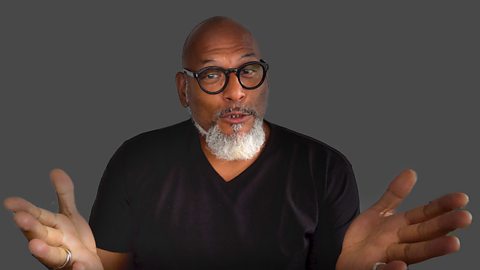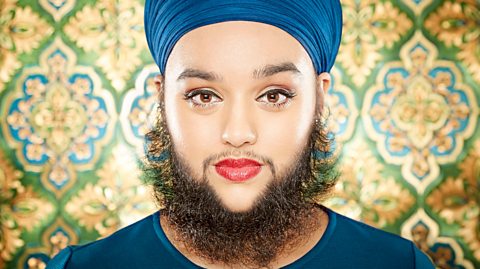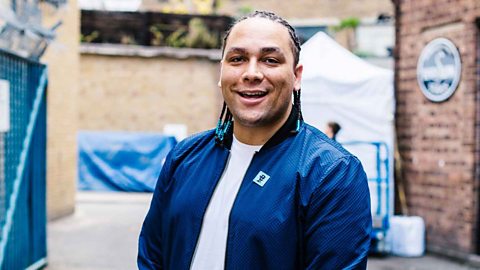This article was first published in June 2020.
The killing of George Floyd by police officers in the United States in 2020 sparked a movement for change around the world, but despite this renewed hope, racism is still prevalent in society and this could be having an impact on our mental health.
We've asked Kadra Abdinasir from the Centre for Mental Health for her advice on how to look after your mental health if you have been affected by racism.
Kadra: Hi there. My name is Kadra Abdinasir from the charity Center for Mental Health. Today I would like to talk to you about racism, how it can affect your mental health and what you can do to help overcome this. Experiencing racism and racial bullying can really impact the way you think and feel about yourself and your overall mental health, it may cause you to feel really down, worried, fearful and anxious. People who experience racism are also likely to feel lonely and isolated because they are treated differently simply because of the colour of their skin or where they come from.
Racism can be traumatic, especially if you are seeing violent images and videos circulating online or if you yourself, have been subjected to a racially motivated attack. This can affect your sleep and you may be constantly replaying the incident over and over again in your mind. Sometimes it can also make you doubt yourself because others may not perceive what has happened to you as a racist incident. It's really important to remember that your feelings are valid and important and must be heard. It's also important to know that all of these are just some of the examples of normal reactions to experiences of racism and yours may differ from somebody else's, and that's all right, it's your experience.
Firstly, it's important you talk to somebody about your experiences. This can be a trusted adult such as your carer or a teacher. They can help you report and deal with the situation. If you're worried about how it's impacting your mental health, speak to your GP or another health professional such as a school nurse. They will make sure that you get the right support you need. There are also a range of free and confidential advice and helplines you can access over the phone and online, such as those offered by Childline or the charity MECS, there's also a crisis messenger service if you need urgent help.
There are lots of images and videos displaying acts of racism and violence. Try and manage your content by blocking of filtering out words that negatively impact the way you feel. It's important to also take breaks from social media if you feel it's getting all a bit too much, and remember to try and switch off at least an hour before bedtime so it doesn't affect your sleep. Firstly, eating well, moving every day and getting a good night's rest are key when it comes to our overall mental health. Do something you enjoy every day, even if it's just half an hour to indulge an activity or a hobby that you enjoy.
Exploring your heritage and culture can be really powerful and can help you understand yourself better. You might also discover a really interesting fact about your heritage. You can also join groups and networks to connect with others who want to campaign against racism. This can make you feel supported and heard. Talking about racism and having conversations with your family and friends can be difficult, but getting it out there sometimes can make us feel a bit better and feel heard. It can also encourage others, including yourself, to take action to address it.
Talk to somebody about your experiences.
How can racism impact on your mental health?
Racism can affect the way you think or feel about yourself and can impact on your mental health. Kadra explains that racism can be traumatic, even if it's experienced indirectly, such as watching violent videos of racist attacks online. If you experience it, it's really important, she says, "to remember that your feelings are valid and important and must be heard."
Incidents of racism can play on your mind and may even affect your sleep.
These are just some of the examples of normal reactions to experiences of racism and yours may differ from somebody else's… and that's all right. It's your experience.
– Kadra Abdinasir
What can you do if you are affected by racism?
Here are Kadra's tips if you are worried that you have been affected by racism and what you can do to boost your mental health:
1. You should speak to someone about your experiences such as a parent, carer or teacher. You could also speak to your GP or school nurse.
2. There are a range of free and confidential helplines and services online.
3. Try and block or filter out content online that negatively impacts the way you feel. Take a break from social media if you feel it's getting a bit much and switch off from your phone one hour before bedtime so it doesn't impact your sleep.
4. If you feel that racism is affecting your mental wellbeing then try and do something you enjoy every day to take your mind off things.
5. Research your heritage and culture as this can be a powerful tool to help you to understand yourself better. There are many groups and organisations you can join to connect with others who want to campaign against racism. This can make you feel supported and may ease your worries.

If you need support
You should always tell someone about the things you’re worried about. You can tell a friend, parent, guardian, teacher, or another trusted adult. If you're struggling with your mental health, going to your GP can be a good place to start to find help. Your GP can let you know what support is available to you, suggest different types of treatment and offer regular check-ups to see how you’re doing.
If you’re in need of in-the-moment support you can contact Childline, where you can speak to a counsellor. Their lines are open 24 hours a day, 7 days a week.
There are more links to helpful organisations on BBC Action Line.

Non-racist v anti-racist: what’s the difference?
John Amaechi talks about the difference between being non-racist and anti-racist.

How I beat my bullies, by Harnaam Kaur
Harnaam Kaur on how building a relationship with herself was the key to beating her bullies.

How to deal with racist bullying at school
Alex Holmes talks about his experiences of being racially bullied in school and what you can do if you are experiencing racism.
